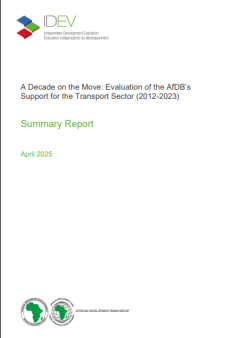
Evaluation of the AfDB’s Support for the Transport Sector (2012-2023)
The evaluation looked at how well the AfDB performed in areas like roads, railways, air transport, waterways, and urban transport, focusing on regional transport strategies. It then drew lessons for future initiatives.
The evaluation found that the AfDB transport sector initiatives aligned with international frameworks, as well as with the AfDB's corporate and regional strategies and those of the countries it serves. It was noted that collaboration with development partners improved, though the level of collaboration varied by region, depending on local contexts and government control. Many projects built on previous ones funded by the AfDB and benefited from coordinated efforts by donors, leading to more effective transport investments. The evaluation found that the Bank's support helped improve connectivity, facilitate trade, promote regional integration, and boost economic growth. However, there were challenges related to efficiency, sustainability, and lack of adequate consideration for cross-cutting issues of gender inclusion and climate resilience. Some of these challenges stemmed from the rigidity of the Bank's procedures, a lack of expertise within regional economic communities and project implementation units, and obstacles that hindered private sector investment.
The evaluation drew lessons and recommendations on how to better include ancillary components in infrastructure projects, address state fragility, enhance climate resilience, promote gender inclusion, ensure that infrastructure is maintained sustainably, and improve stakeholder involvement and project execution.
